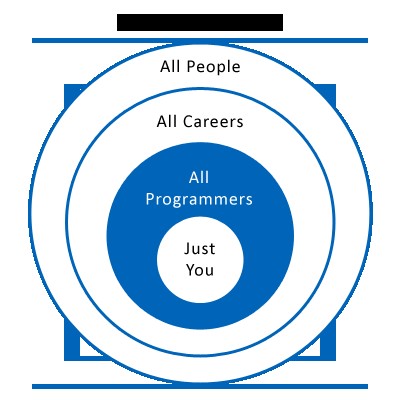It’s a sentiment echoed more often than you might think: “I don’t find programming fun anymore.” For many who once eagerly dove into the world of code, the reality of a programming career can be surprisingly different. The initial excitement can wane, replaced by frustration, complexity, and a nagging feeling that this path might not be the right long-term fit. This feeling isn’t uncommon, and it’s perfectly valid to question whether a career solely focused on programming is still the right direction.
Consider these experiences shared by programmers:
I finished a computer science degree last year, worked about a year in the Java EE stack. I liked requirements engineering and more ‘management stuff’ in university, but let’s face it: you tend to be driven to be a programmer. I enjoy programming itself. I’m not doing it that badly, I even do it better than some people. But it’s too frustrating. Stupidly complex stuff (that people consider “standard” even if it’s extremely complicated!), fighting against the computer, dumb errors, configuration, and stuff that people even worse than me implemented and I have to take care of. New stuff which is supposed to be incredibly easy, and it’s just one more framework.
I think I realized I don’t want to program because I landed at a company where people are quite good. And I honestly think I won’t achieve that level, ever. And I don’t enjoy programming as a hobby.
I’m sure that I’m good enough to be able to make a living continuing as I am … but I don’t want to.
And another perspective:
Since the first year of studying programming at university I have known in my heart that computer programming is not meant for me, but I was afraid to do anything about it and here I am now 12 years later programming with no passion. I am a career programmer and an average one at best.
I come to work every day with no passion I just do it to pay the bills. I have done some good projects but I am not at all into it.
These are real sentiments from programmers facing a common crossroads. They possess the skills, they can perform the job, but the passion simply isn’t there. If you find yourself in a similar situation, feeling that programming as a career isn’t bringing you joy or fulfillment, know that you are not alone. The question then becomes: what are the alternatives? What career paths can leverage your valuable technical background if you don’t find programming fun anymore?
Forums and Q&A sites like Stack Overflow and its sister sites, while invaluable for technical problem-solving, often struggle with career-related questions. The very nature of career inquiries tends to be personal and sometimes opinion-based, making them less broadly applicable to the wider programming community. The ideal question for such platforms aims for universal relevance, benefiting a vast audience of programmers.
Stack Exchange uses a helpful visual to illustrate this concept of question applicability:
 Target audience for programming questions: Aim for questions relevant to all programmers, not just a few.
Target audience for programming questions: Aim for questions relevant to all programmers, not just a few.
The goal is to ask questions that hit the “All Programmers” target – questions and answers that provide lasting value to a wide range of individuals in the field. Career questions, however, can sometimes fall outside this scope, being perceived as too narrow or subjective.
But the underlying question remains crucial: what career options are genuinely available to programmers who no longer wish to spend their days writing code? It’s a question that deserves exploration, grounded in facts and experience, to offer guidance to those considering a shift.
It’s worth acknowledging that programming, while intellectually stimulating, isn’t universally enjoyable as a career. Passion plays a significant role in sustained engagement. If you’ve dedicated years to programming without developing a genuine enthusiasm, it’s unlikely to suddenly ignite. However, the fact that you’ve persisted this long suggests a degree of resilience and valuable skills that can be transferable.
Before completely abandoning the field, consider whether the environment itself might be contributing to your lack of enjoyment. The context in which you program can drastically alter your experience. Are you working in:
- A fast-paced, demanding startup?
- A stable but potentially less dynamic small business?
- A large corporation with complex hierarchies?
- A client-facing consultancy with constant project changes?
- The unpredictable world of freelancing?
Each of these environments presents a unique set of challenges and rewards. The nature of the programming tasks, the team dynamics, and the overall company culture can significantly impact your job satisfaction. Perhaps a change of environment, a shift in company type or team, could reignite your interest or at least alleviate some of the frustrations.
However, if you’ve explored different environments and the core issue remains – the act of programming itself is no longer enjoyable – then it’s time to consider related career paths that leverage your technical foundation without requiring you to be solely a coder. Fortunately, a strong programming background opens doors to a variety of roles. These positions often value individuals who possess a deep understanding of technology, problem-solving skills, and a logical mindset – all cultivated through programming experience.
Here are several career options where programming skills and a technical background are highly advantageous, and where former programmers have found success:
-
Product/Program Manager: Product and Program Managers are crucial in defining and guiding the development of software products. Your programming experience gives you a unique advantage in understanding the technical feasibility of features, communicating effectively with engineering teams, and making informed decisions about product direction. You can bridge the gap between business requirements and technical implementation, ensuring products are both valuable and technically sound.
-
Project Manager: In the tech world, Project Managers with a technical background are highly sought after. Your understanding of the software development lifecycle, potential technical roadblocks, and team dynamics makes you exceptionally well-suited to manage software projects effectively. You can anticipate challenges, communicate realistically with stakeholders, and ensure projects are delivered on time and within budget.
-
QA / Testing: High-quality software testing is paramount, and skilled testers with programming knowledge are invaluable. You can develop more effective test cases, automate testing processes, and understand the nuances of code to identify potential bugs and vulnerabilities. Your ability to think like a programmer makes you a more insightful and impactful tester.
-
Build Engineering: The seemingly invisible but critical field of build engineering involves managing and optimizing the software build, release, and deployment processes. Your programming skills are essential for automating these processes, ensuring smooth and efficient software delivery pipelines. You can troubleshoot build issues, improve system performance, and contribute to the overall efficiency of the development workflow.
-
System Administrator: System administrators manage and maintain the IT infrastructure that underpins software systems. Your programming knowledge allows you to automate system administration tasks, write scripts for monitoring and maintenance, and understand the technical complexities of server environments. You can go beyond basic administration and contribute to system optimization and security.
-
Technical Sales: Technical sales roles require individuals who can understand and explain complex technical products to potential clients. Your programming background gives you the credibility and technical depth to effectively communicate the value proposition of software solutions, answer technical questions confidently, and build trust with technically savvy clients.
-
Technical Writer: Technical writers bridge the gap between engineers and end-users by creating clear and concise documentation for software products. Your programming knowledge allows you to understand the intricacies of the software and translate complex technical information into user-friendly guides, tutorials, and API documentation.
-
Business Analyst / Programming Analyst: Business Analysts with a programming background can effectively analyze business needs and translate them into technical requirements for software solutions. Your understanding of both business processes and technical possibilities makes you a valuable asset in defining project scope, gathering requirements, and ensuring alignment between business objectives and technical implementation.
In many of these related fields, individuals with genuine programming expertise are surprisingly rare. This lack of technical depth can be a significant disadvantage. Your programming background equips you with the ability to truly understand the technical underpinnings of projects, communicate effectively with technical teams, and make informed decisions in a way that those without coding experience often cannot. You can cut through technical jargon, identify potential issues early on, and ensure that technical considerations are appropriately addressed.
Ultimately, career decisions are deeply personal. Only you can determine the right path for your long-term happiness and fulfillment. However, if you’re a programmer who no longer enjoys programming as a primary career focus, remember that your technical skills are highly transferable and valuable. Exploring these related professions can open doors to new opportunities, allowing you to leverage your expertise in ways that are both professionally rewarding and personally satisfying, even if you don’t find programming itself fun anymore.

